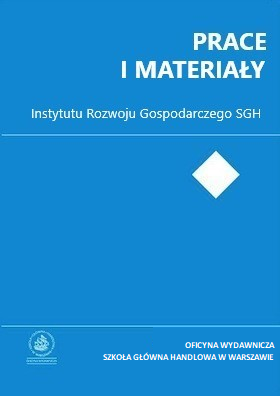Zmiana otoczenia polityki gospodarczej po integracji z Unią Europejską
Main Article Content
Abstract
The integration of economies in real terms, taking place for better utilisation of resources and enhanced efficiency and innovation is a basis of institutional integration. It is regulatory integration that - in turn - is essential for better co-operation of entities and states as it makes institutional systems associate closer. If it is not possible within the whole group, it occurs among the most closely associated states, i.e. a 'club'. Institutional integration facilitates co-operation between entities and makes it more predictable. There exist grounds for both larger centralisation and decentralisation of groups undergoing the integration process. Decentralisation is prompted by the willingness for better consideration of differentiation of preferences, while centralisation is supported by the existence of external effects of policies of individual countries as well as a possibility of using large-scale effects. It is the subsidiarity idea that is an attempt to reconcile the two tendencies. In line with the idea ' The Community should take action in accordance with the subsidiarity principle only and exclusively to such an extent to which objectives of the action proposed may fail to be sufficiently accomplished by the member States'. The European Union, in some small number of fields, has got exclusive competence of acting. In majority of fields the competence is shared by the Union and its member states. On the other hand, there are a few fields where the Union may provide a support action only. In line with sociological research findings, the citizens of the European Union would rather tend to provide the Union with larger scope competence. This concerns mainly the citizens of new member states as well as the countries where public administration is considered inefficient. In real terms the division of competence within the European Union is carried out basing on variety of patterns and depends on the integration subject (legislation, political decisions, implementation) as well as on a field of politics. The system of cooperation is complicated with supplementary forms (binding obligations, coordination) playing a significant role. Efficiency is assessed as low especially regarding the Lisbon Strategy as well as The Economic and Monetary Union. The European Union is in a process of management reform, the Lisbon Treaty being its basis. The regulatory environment of the European Union undoubtedly constitutes some restrictions to the economic system and directions of member countries policy. It is them that cannot abandon e.g. rules of competition or the Common market. Yet, such an environment does not result in homogenous institutional systems. After Poland's accession to the European Union, the integration of Polish economy with the one of the EU has been taking place. This results in social pressure on the adjustment of regulations and policy to the European objectives providing -simultaneously - a guarantee of the environment stability. (original abstract)
